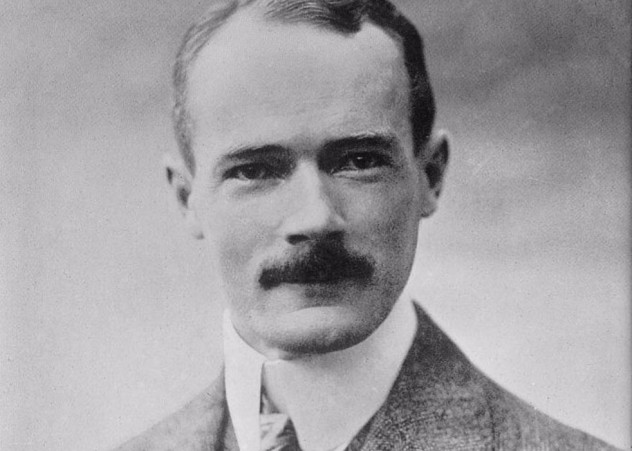 Misconceptions
Misconceptions  Misconceptions
Misconceptions  Books
Books 10 Famous Writers Who Came Up with Everyday Words
 Mysteries
Mysteries 10 Unsolved Mysteries from the Cold War
 Pop Culture
Pop Culture 10 Fictional Sports That Would Be Illegal in Real Life
 History
History 10 Mind-Blowing Facts from History That Don’t Seem Real
 Movies and TV
Movies and TV 10 Unconventional Ways Famous Actors Got into Character
 Weird Stuff
Weird Stuff 10 Bizarre & Heartbreaking Stories Straight from the Restroom
 Miscellaneous
Miscellaneous 10 Restaurants Busted for Selling Drugs
 Politics
Politics 10 U.S. Policies That Were Passed Based on False Information
 Technology
Technology 10 Ingenious Tech Experiments That Think Outside the Box
 Misconceptions
Misconceptions 10 “Groundbreaking” Scientific Studies That Fooled the World
 Books
Books 10 Famous Writers Who Came Up with Everyday Words
 Mysteries
Mysteries 10 Unsolved Mysteries from the Cold War
Who's Behind Listverse?

Jamie Frater
Head Editor
Jamie founded Listverse due to an insatiable desire to share fascinating, obscure, and bizarre facts. He has been a guest speaker on numerous national radio and television stations and is a five time published author.
More About Us Pop Culture
Pop Culture 10 Fictional Sports That Would Be Illegal in Real Life
 History
History 10 Mind-Blowing Facts from History That Don’t Seem Real
 Movies and TV
Movies and TV 10 Unconventional Ways Famous Actors Got into Character
 Weird Stuff
Weird Stuff 10 Bizarre & Heartbreaking Stories Straight from the Restroom
 Miscellaneous
Miscellaneous 10 Restaurants Busted for Selling Drugs
 Politics
Politics 10 U.S. Policies That Were Passed Based on False Information
 Technology
Technology 10 Ingenious Tech Experiments That Think Outside the Box
10 Pardoned Perpetrators Of Heinous Crimes
Nobody commits a crime with the intention of getting caught, but getting caught doesn’t necessarily mean staying behind bars. It isn’t always clear why a pardon is given, especially when it means that truly twisted criminals are granted forgiveness. Regardless, those in power do wield the privilege to bestow clemency—despite the public outcry of the victims and their families.
10 Gustav Krupp

Krupp, born Gustav Von Bohlen Und Halbach, was a Prussian diplomat who took over his wife’s family’s industrial empire—and her family name—in the early 20th century. He contributed tanks, cannons, and submarines to Germany’s arsenal during World War I. Despite Germany’s losing the war, Krupp was still able to profit from the loss of life with a deal he had brokered with a British manufacturer of artillery shells before the war.
Not too long after World War I, Krupp was back at it, putting his money toward the secret rearmament of Germany and helping to finance the Nazi party rise to power in the early 1930s. He became the president of the Reichsverband der Deutschen Industrie and began methodically removing Jewish industrialists from their positions.
During World War II, Krupp took full advantage of Nazi ideology and used slave laborers from concentration camps as well as prisoners of war to work in his factories. The slave workers were transported to Krupp Works by cattle car and crammed into tiny spaces, unable to move freely. They were often beaten and kicked if they didn’t exit the train car fast enough. The senior doctor stationed at the “Krupp camps” to oversee the health of the laborers stated that many were suffering from “open festering wounds and other diseases” and that the fleas and insects were rampant, causing sores and boils to appear on the skin.
Gustav Krupp was arrested after the war. He was charged with exploiting the anti-Jewish measures in place during the Nazi reign and of knowingly using slave labor. In 1948, before he could stand trial for his crimes, the court found him to be too senile and believed he would not understand what was going on around him, which would result in an unfair trial. Krupp never served time for his crimes.
9 Alexander William Holmes

Alexander Holmes was a crew member on the William Brown, an American ship that set sail for Philadelphia from England in March 1842. The ship carried 65 passengers, mostly immigrants from the United Kingdom, and nearly 20 crewmen. Six days after setting sail, the ship struck an iceberg in the Atlantic Ocean and sank into the frigid, rough waters.
The ship had only two lifeboats—not nearly enough to hold all of the travelers. During the scramble, 31 passengers were left on the ship and subsequently drowned. With the seamen in one lifeboat and the remaining passengers in the other, the survivors huddled together to keep warm against the high winds and heavy rain. Holmes soon realized that after two days afloat and no rescue in sight, the worsening weather conditions and the possibility of capsizing would prove to be the death of those aboard the two overcrowded boats unless drastic action was taken.
Holmes and some other crew members began throwing surviving passengers overboard. In total, 14 men and two women were thrown into the Atlantic and left for dead. During his trial, Holmes apologized for sacrificing the passengers to the freezing waters, stating that they were nearly dead from the cold anyway. Holmes was charged with manslaughter, sentenced to six months in prison, and given a $20 fine. President John Tyler initially refused to issue a pardon, but later issued one in November 1842 that relieved Holmes of his fine.
8 Marc Rich

He may not have committed murder (as far as we know), but Marc Rich did land himself on the FBI’s “10 Most Wanted” list. The former billionaire made his living as a commodities trader and was known by his business partners as the “King of Oil.” Rich immigrated to the United States with his parents in 1943 to escape the persecution of the Jews in Europe, working his way up from mail room clerk to one of the founding partners of a major multinational commodity trading company.
This was not the only escape Rich would make in his life, however. In 1983, the billionaire fled to Switzerland after he was indicted on 65 counts of tax evasion, mail fraud, racketeering, defrauding the Treasury, and trading with the enemy. Rich was accused of illegally purchasing millions of barrels of oil from Iran during a time when the United States had banned all trade with the country because of the 1979–81 hostage crisis. But that wasn’t Rich’s only oil-based crime. He also developed a complex scheme that allowed him to mislabel oil and sell it at a 400 percent markup, amassing over $100 million while simultaneously avoiding $48 million in taxes.
For almost two decades, Rich avoided extradition and refused to return to the United States for fear of being jailed. As his lawyers worked tirelessly to clear him of charges, Rich made the decision to try to receive a pardon from the White House just as former President Bill Clinton was nearing the end of his final term in office.
On January 20, 2001, Clinton’s last day in office, Rich received an official pardon. He never returned to the country, despite being cleared of charges. It was later learned that Rich’s ex-wife had made sizable donations to the Clinton Library and the Democratic Party.
7 Peter Yarrow
Think back to those happy childhood years and all the simplicity and joy that came with being blissfully unaware of the seedy underbelly that exists just below the surface of our favorite kid’s songs and stories. Whether you were a child of the ’60s or not, you may still remember the classic and catchy children’s song “Puff the Magic Dragon.” While it’s safe to assume that most of you have heard the theories surrounding the not-so-subtle double meaning behind this beloved ballad, something you may not know is that singer-songwriter Peter Yarrow found himself in legal trouble at one time—the really, really bad kind that involves an underage girl.
In 1970, Yarrow was accused of and confessed to molesting a 14-year-old-girl while on tour. Yarrow was staying at a hotel in Washington, DC, when a young gal came to his hotel room in search of an autograph. Instead, she was met at the door by a naked 32-year-old Yarrow. He made sexual advances toward her and later admitted to taking “immoral liberties” with the child groupie.
Yarrow ended up serving only three months of his one-year prison sentence. In 1981, President Jimmy Carter formally pardoned him. Some speculate that Yarrow’s marriage to the niece of a Democratic senator at the time of his arrest may have contributed to the pardon. Either way, one thing is certain: “Puff the Magic Dragon” will never be quite the same.
6 Clarence Jones

We all get in fights with people we are in relationships with. Be it friend, spouse, or partner, it’s totally normal. What’s not normal, however, is stabbing someone over such an argument. What’s even less normal, you ask? Doing it 22 times and still getting let off the hook.
Clarence Jones waited patiently for his ex-girlfriend Carla Smith to return to her apartment on New Year’s Day in 1992. Once she walked through the door, he proceeded to kill her by plunging a knife into her body 22 times.
He later confessed to killing her and was sentenced to life in prison. He did not end up serving out his sentence. Jones remained in prison for less than 20 years before his sentence was suspended by Mississippi Governor Ronnie Musgrove in 2004. He received a pardon from Governor Haley Barbour in 2008. Since receiving his pardon, Jones has appealed that his criminal record should be completely cleared and that all former charges be expunged from his file. His request has not been granted.
5 Lord Greville Janner

People evoke all types of defenses to avoid punishment. When you were little, it might have been insisting it wasn’t you or pointing the finger at someone else. Perhaps you tried the old, “I don’t know, I don’t remember!” The line may not have worked for you, but it did for Lord Greville Janner, a British politician who has been accused of 22 counts of sexual abuse—including a victim under the age of nine—over a period of three decades.
The children Janner is accused of abusing were residents of a children’s home in the county of Leicestershire, England. Evidently, Janner knew the manager of the home and convinced him to allow him access to the young residents. Janner was questioned about these crimes in 1991 following several complaints of sexual assaults by his victims. However, police believed there was not sufficient evidence to charge him at the time, and Janner was not prosecuted.
Now, many years later, Janner is once again being summoned to pay for his horrendous crimes. This time, his legal team is arguing that he is not fit to stand trial because he has Alzheimer’s disease. His lawyer believes that even though there is enough evidence to prosecute him, Janner is simply not medically fit to stand trial.
Not all hope is lost, however. In June 2015, a high court judge decided that Janner will face trial later this year despite his current mental condition. Whether or not he is convicted, the fact still remains that the now 86-year-old Janner hasn’t yet spent time behind bars for his ghastly crimes.
4 Jimmy Lee Avera

It was practically love at first sight when Jimmy Lee Avera met Tabitha Sparks in the early ’90s. Just a few short months after they met, the two became engaged to be married and were making plans to move in together. It wasn’t long before the relationship began to fall apart. Sparks decided to move out of the house. Avera, saddened by the circumstances of his decaying relationship, grew increasingly depressed.
What occurred in the following weeks is still debated, but Avera, after a failed attempt to talk Sparks into getting back together, decided to show up at her trailer one evening with a gun. Maybe he could scare her into reviving their romance.
After a bit of arguing, Avera shot and killed his pregnant 24-year-old ex-girlfriend while her two children slept in the other room. He fired the gun a total of 11 times and shot her in the back as she attempted to run away from him. Avera was arrested and sentenced to life in prison in 1994 but was released on parole less than 20 years later. In 2012, the pardon-happy Mississippi Governor Haley Barbour granted Avera a complete and unconditional pardon.
3 Ramil Safarov
Ever heard of Azerbaijan? Located in Southwestern Asia between Iran and Russia, this nation, which is almost 95 percent Muslim, was part of the Soviet Union for seven decades until receiving its independence in 1991. It is also the home of Ramil Safarov, an Azeri military officer convicted in 2004 of hacking a fellow officer to death with an axe while he slept.
Safarov, who committed the murder while stationed in Hungary, killed the officer because he was Armenian. Azerbaijan and Armenia are longtime enemies and have had several bloody arguments over Nagorno-Karabakh, a territory with disputed ownership. Safarov was given a life sentence for the brutal crime in 2006. In 2012, just a few years into his sentence, Safarov was extradited to the Azeri capital of Baku by the Hungarian government under the condition that he would serve out his prison sentence in his homeland.
Instead, Safarov was given a warm welcome and declared a hero. President Ilham Aliyev pardoned Safarov almost immediately after his plane touched Azerbaijani soil and even reinstated Safarov to the army, promoting him to the rank of major.
2 Kim Hyon Hui

Born in Pyongyang, Kim Hyon Hui had an early start participating in North Korean propaganda as the daughter of a diplomat. With a sharp mind and the ability to speak Japanese fluently, she was soon scooped up by the tyrannical government, who sent a black sedan to pick her up after school one day, to begin her training at North Korea’s elite and remote spy school.
After six years of training that promoted high levels of proficiency with weaponry, martial arts, and foreign languages, Kim was ready to be assigned her mission—blowing up South Korean Air Flight 858 with 115 passengers onboard. In 1987, Kim and her accomplice boarded Flight 858 in Baghdad with a live bomb stowed in her carry-on. Before exiting the plane during a layover in Abu Dhabi, Kim stored her explosive luggage in the overhead compartment. The bomb exploded just a few hours later as the plane was flying over the Andaman Sea, killing all those onboard.
Authorities soon caught up to the terrorist pair, but before her accomplice could be formally charged, he had ingested a cyanide pill that was hidden in a cigarette and died. Kim had also ingested cyanide, but she was resuscitated. During an interrogation conducted in an underground bunker in Seoul, Kim confessed to the crime and was sentenced to death.
In 1989, however, South Korean president Roe Tae Woo pardoned her, believing she had been brainwashed by the oppressive government and was acting out of fear for the safety of her family still living in North Korea. Kim Hyon Hui later went on to marry one of the South Korean intelligence officers who interrogated her for the bombing. She currently lives in an undisclosed location in South Korea and maintains that Christianity has helped her find peace with her horrendous crime.
1 William Calley

War breeds all types of horrific events. Death, destruction, and mass devastation are a given, but then there are some atrocities that stick out as exceptionally cruel and grisly. William Calley, aka the “Monster of the My Lai Massacre,” is definitely worthy of the villainous nickname.
Calley was a lieutenant in the Vietnam War. While he and the Charlie Company, an American contingent of about 100 soldiers, were traveling through the Vietnamese countryside on the lookout for Vietcong troops, they stumbled across a remote village called My Lai. Rather than continue onward and leave the peaceful village be, Calley led a brutal attack that resulted in the deaths of 500 villagers. The youngest victim was just a year old, and the eldest was 82. The rap sheet of barbarities was long and included the rape of many teenage girls, bayoneting babies, and forcing family members to watch as their loved ones were murdered.
In 1971, Calley was convicted of killing 22 civilians of My Lai. He was sentenced to life in prison, but he only served three years under house arrest after President Nixon reduced his sentence by granting him a tacit presidential pardon. Bizarrely enough, Nixon went on to receive a presidential pardon as well for his own dirty deeds later that year.
Lee DeGraw is a freelance writer. She is not distantly related to any country singers. She has yet to commit any crimes, pardoned or otherwise.








